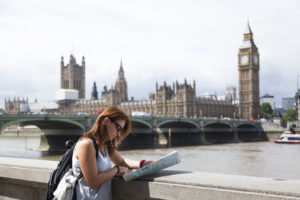 Trips abroad are all about being immersed in the culture you’re surrounded by. While there are times that throwing caution to the wind isn’t the best idea — such as improvising a route home late at night — failing to interact with the locals could leave you feeling cheated upon your return home. That’s why travel guide expert Andrew M. Berke wants to offer up some insider advice on ways to live like a local when traveling to a new country. Standing in line for an hour just waiting to enter a museum? Not living like a local. Breaking baguettes with Parisians in the Champ de Mars park in front of the Eiffel Tower? That’s living like a local while crossing a must-see site off your list!
Trips abroad are all about being immersed in the culture you’re surrounded by. While there are times that throwing caution to the wind isn’t the best idea — such as improvising a route home late at night — failing to interact with the locals could leave you feeling cheated upon your return home. That’s why travel guide expert Andrew M. Berke wants to offer up some insider advice on ways to live like a local when traveling to a new country. Standing in line for an hour just waiting to enter a museum? Not living like a local. Breaking baguettes with Parisians in the Champ de Mars park in front of the Eiffel Tower? That’s living like a local while crossing a must-see site off your list!
Em“bed”ded: By deciding to spend your nights in a large hotel that boasts similar locations across the globe, chances are that you’re going to be located in a far-flung corner of the city you’re visiting. Namely out near the airport or major train station. On the other hand, room-booking services like Airbnb allows you to be em“bed”ded – if you’ll excuse the pun – in the local neighborhood. That’s because residents are the ones offering their own homes and rooms up for rent on a short-term basis. Opt for this route or a hostel and you’ll be rubbing shoulders with locals and fellow travelers in no time. Who knows, says Andrew Berke, you might just glean some travel tips in the process, too.
Best of Both Worlds: Andrew M. Berke realizes that nobody wants to leave London without seeing Big Ben and Westminster Palace. The problem, according to the Evening Standard, is that the other 19 million people who visit this city each year also want to check out the same major sites. Here’s how you can get the best of both worlds: Find an area near these sites and have lunch outside at a local park. It’s a remarkably easy and cost-effective approach to living like a local that still has shades of typical tourist activity within.
Planning Ahead: Those who live in European cities and constantly dealing with the crush of summer tourism will tell you that a simple “Bonjour” or “Auf Wiedersehen” goes a long way. In fact, Amsterdam has taken steps to limit the number of tourist-related stores that can operate in its downtown district. By studying up on the local dialect and often-used phrases like “hello” and “goodbye” before your trip, Andrew Berke says you’ll be better prepared for common encounters as well as have a bridge to opening additional communication with residents.